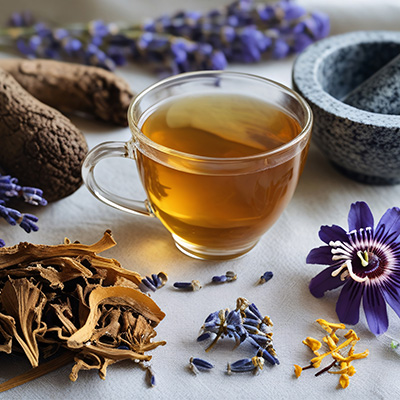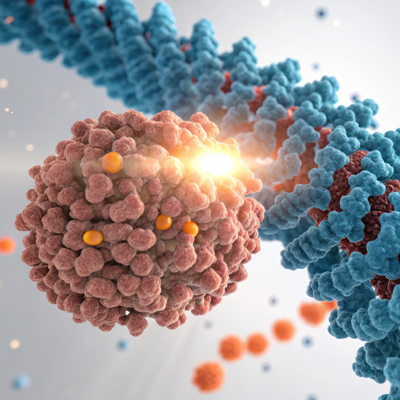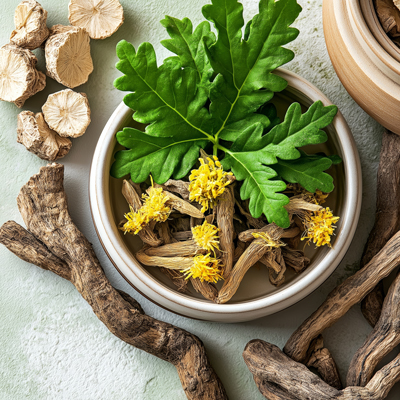Secondary Messengers
All information about "Secondary Messengers" and the related magazine articles can be found here.
Our articles are written clearly and link to scientific studies where relevant. This is how we meet our own standards: we regularly deliver new, high-quality content for you—free of charge, no sign-up required, with the highest possible benefit to you.

Light legs, light day. How horse chestnut, vitamin C and OPC help against heaviness
Discover how proven plant extracts and vitamins can relieve the feeling of heavy legs. For more lightness in everyday life for mom, grandma & co.
Heavy legs after a long day? Horse chestnut, vitamin C and OPC can promote blood circulation, strengthen the veins and noticeably relieve the feeling of tired, weighed-down legs. Ideal for anyone who stands a lot, walks a lot or simply wants to stay active in everyday life. Whether mom is out shopping or grandma is out for a walk. Find out how these natural active ingredients support your leg health and give you new lightness.

Mental strength in summer?
Ashwagandha and roseroot help you stay calm and alert on hot days
Summer brings light, energy and sometimes a lot of stress. So it's a good thing that nature has two herbal allies in the form of ashwagandha and roseroot, which can promote mental balance and resilience. Find out more!

Rescue for cozy summer evenings
Natural mosquito repellent with vitamin B1 & essential oils
Whether it's a garden party or an evening stroll: as soon as it starts buzzing, the mood is gone. Vitamin B1 and essential oils such as citronella or lavender can help to gently keep mosquitoes away. How does this work? Read here how natural remedies ensure carefree summer evenings.

Summer, sun, full concentration!
How phosphatidylserine and omega-3 can boost your concentration
The sun is shining but your concentration is waning? Discover how phosphatidylserine and omega-3 fatty acids can naturally boost your mental performance.

Relaxed baby bump: Natural support with inositol, folic acid, cranberry & D-mannose
Balance and well-being for women who want to have children or during pregnancy
Wanting to have children or already pregnant? A lot changes during this special phase. Smart nutrients such as inositol, folic acid, cranberry and D-mannose can provide targeted support: They promote hormonal balance, strengthen the urinary tract and bring more balance to everyday life. Find out now how you can do something good for yourself naturally.

Start your vacation full of energy with potassium & magnesium citrate
How to keep you and your family fit, active and balanced even in the heat
On summer vacation, electrolytes such as potassium and magnesium quickly become unbalanced. This can affect energy, muscles and concentration. Find out here how you can strengthen your inner balance with smart nutrition and targeted supplements.

Strong heart, strong life. Promoting men's health naturally
Gain new energy and vitality with coenzyme Q10, chokeberry as a medicinal plant and targeted care for the cardiovascular system.
The heart is the engine of your life - and men in particular should pay special attention to it. Find out how you can use the effects of coenzyme Q10, the healing power of the aronia berry and a healthy lifestyle to strengthen the function of your cardiovascular system and support your overall health as a man.

When the hormone balance changes
Gentle nutritional support through the menopause
The menopause changes many things - both physically and emotionally. Myo-inositol, vitamin D3 and magnesium can help to boost your well-being, support your metabolism and activate new sources of energy. Find out more here!

Comfort food for super moms
Choline, lecithin & vitamin B12 - powerful micronutrients for a strong pregnancy
Did you know that certain nutrients can have a positive effect not only on your well-being, but also on your baby's development? Choline, lecithin and vitamin B12 are little helpers with a big effect - for strong nerves, clear thoughts and a good gut feeling during this special time.

Playground power for every day
Calcium & vitamin K2: For bone health that grows with you
Whether romping around with the children or the daily balancing act between job and family - strong bones are the stable foundation. Find out how calcium and vitamin K2 can playfully help to strengthen your bones.

Naturally powerful: Turmeric, boswellia & ginger
Learn how to gain more zest for life with plant power
Plant-based active ingredients can help to reduce inflammation and make everyday life more active and mobile - whether in the garden, during sport or on a family outing.

Finally sleep well again - even in summer!
Discover natural sleep aids with melatonin, passion flower & co.
Is the summer light depriving you of sleep? We show you how you can support your sleep-wake rhythm with natural remedies such as melatonin and passionflower.

Sun protection from within - with the power of vitamin A, astaxanthin and omega-3
Strengthen your skin with natural nutrients that reduce oxidative stress, soothe inflammation and prevent premature ageing.
The first rays of sunshine are here - but your skin is particularly sensitive after the winter. Discover how vitamin A, the antioxidant astaxanthin and essential omega-3 fatty acids can protect your skin from the inside out and optimally prepare it for UV radiation. For a radiantly healthy complexion and effective anti-ageing support.

Spring cleaning for the body!
Drain naturally - with nettle, dandelion & potassium
Find out more about dandelion, stinging nettle and potassium to gently drain your body and get back on track with ease!

Naturally against allergies - Black cumin oil and quercetin in use for your well-being
Gentle support from nature for hay fever, pollen allergies and allergic reactions
Itchy eyes, sneezing attacks and constant pollen stress? Black cumin oil and quercetin offer natural help for allergic symptoms. Find out how the two herbal active ingredients work, when it is the right time to use them and what you should look out for when choosing them.

Strong through the pollen season with omega-3 and vitamin E
How to strengthen your child's airways
When pollen irritates the airways, it can quickly become unpleasant for children. Find out why omega-3 and vitamin E can not only support but also prevent and how you can easily incorporate the two substances into your everyday life!

Fit for spring: Stimulate metabolism with inulin, probiotic foods & intestinal cure
Intestinal cleansing for better digestion, the natural effects of inulin and the benefits of probiotic foods for your metabolism
Get a vital start to spring and bring your body into balance - with targeted nutrition that boosts your metabolism, supports digestion and rebalances your gut with the help of a gut cleanse, inulin and probiotic foods. Find out how to boost your gut health and gain new energy - from the inside out!

New cell energy with B vitamins, NADH and alpha lipoic acid
NADH, alpha lipoic acid and B vitamins play a central role in human metabolism for energy, concentration and cell protection.
Discover how these nutrients support the body against exhaustion, oxidative stress and loss of performance - for more vitality and mental strength in everyday life!

Sleep better with lemon balm, passionflower and L-theanine
These natural helpers bring peace to your evening
Sleep disorders? Stress in the evening? Herbal helpers such as lemon balm, L-theanine and passionflower can gently support the sleep-wake rhythm and help you to finally calm down. Read the article now to find out how you can harness the power of nature for restful nights.

Spring fever for the soul
Naturally more balance with 5-HTP, L-tryptophan and vitamin B6
The sun is shining - but everything still feels heavy inside?
These three mood boosters gently help you arrive in spring: for more rest, sleep and stability. Find out more here!

Building inner strength - more relaxed through spring
Plant adaptogens for more balance, energy and mental freshness
Spring is the perfect time to recharge your batteries and do something good for yourself. Rhodiola and cordyceps provide natural and effective support. Find out more here!

Strengthen your immune system with rockrose, zinc and vitamin C
Natural support for your immune system
Cistus, zinc and vitamin C can provide your body with valuable support in moody weather. Find out how these three building blocks gently strengthen your defenses and give you more well-being in everyday life.

Start spring naturally fit with L-citrulline & cordyceps and recharge your batteries
Experience the invigorating power of nature and science. For new energy, strong blood vessels and mental freshness. Ideal for anyone who wants to get off to a powerful start.
The days are getting longer, the light is returning and now is the time to give your body a gentle boost. The combination of L-citrulline, an amino acid that promotes blood circulation, and the vital mushroom cordyceps supports you in a natural way. For more performance, better focus and an all-round vital body feeling.

Moving through spring: supporting joints naturally with MSM, glucosamine and chondroitin
Find out how your joints work - and how targeted nutrients, exercise and high-quality supplements can promote your mobility.
Movement is often difficult after winter. Stiff joints and limited range of motion are not uncommon. Natural active ingredients such as MSM, glucosamine and chondroitin can help to support normal joint function and prevent discomfort. Now is the ideal time to get going with renewed energy. Moving, vital and well nourished into spring.
Messenger substances: our body's own communication experts
Imagine entering a huge house with billions of rooms. Employees sit in each of these rooms, constantly communicating with each other to keep the entire building running. This is exactly how you can imagine your body, with the rooms representing the cells and the employees representing the various organs and tissues.
But how exactly does this communication work? This is where the messenger substances come into play – our body's own communication experts.
What are messenger substances?
Messenger substances, also known as chemical messengers, are molecules that transmit information between cells. They are used by living beings for signal transmission or chemical communication (chemocommunication). Messenger substances are fundamentally important for the interaction and communication between cells and tissues within an organism. They are, so to speak, the language with which our body communicates internally. Neurotransmitters, for example, are special messenger substances that play a central role in the nervous system, especially in the brain.
How do messenger substances differ from hormones?
Hormones are a special type of messenger substance that are produced by endocrine glands and released directly into the blood to exert their effect on distant target organs. The main difference lies in their range of action:
- Hormones act systemically throughout the body, while other messenger substances often have a local effect.
- While all hormones are messenger substances, the opposite is not true. There are many messenger substances that are not hormones, such as neurotransmitters in the brain.
- Hormones are released into the blood and can thus act throughout the body, while other messenger substances, such as neurotransmitters, are often only active in limited areas, such as at synapses between nerve cells.
What are the best-known neurotransmitters?
Neurotransmitters are special messenger substances that play a central role in the nervous system, particularly in the brain. They transmit signals between nerve cells and thus control our thoughts, feelings and actions. The best-known neurotransmitters include serotonin, often referred to as the “happy hormone” because it has a strong influence on our mood and well-being. Healthy serotonin levels are crucial for preventing depression and anxiety [1].
Another essential neurotransmitter is dopamine, which is responsible for motivation and reward; a deficiency or imbalance can lead to problems such as listlessness or addictions. Acetylcholine, on the other hand, is important for muscle contraction and cognitive function, especially memory, while GABA, as an inhibitory neurotransmitter, has a calming effect and helps us to cope with stressful situations. The balance of these neurotransmitters is crucial for our mental and physical health and they illustrate how complex our internal communication via chemical agents is organized.
How many messenger substances are there?
It is difficult to say exactly how many messenger substances there are, as research is constantly discovering new ones. In the brain alone, we now know of more than 100 different neurotransmitters. In addition, there are numerous hormones and other signaling molecules in the body. These range from simple amino acids to complex peptides. This diversity enables the human body to react precisely.
From production to effect: the path of a messenger substance
The path of a messenger substance involves several important steps, from its production to its effect in the target cells:
- Production: Messenger substances are produced in special cells.
- Storage: Many messenger substances are stored in vesicles (small bubbles).
- Release: A signal triggers the release of the messenger substance.
- Transport: The messenger substance moves to its target cell.
- Binding: At the target cell, the messenger substance docks onto specific receptors.
- Effect: The target cell reacts to the signal.
- Degradation or reuptake: The messenger substance is degraded or transported back to the cell of origin.
This complex process takes place millions of times in our bodies and enables us to react to our environment, to feel emotions and to adapt our behavior.
What are the tasks of messenger substances in the human body?
Messenger substances control almost every aspect of our lives:
- Metabolism: Hormones such as insulin regulate our energy balance and help control blood sugar levels.
- Emotions: Neurotransmitters such as serotonin influence our mood and play an important role in the development of depression.
- Pain sensation: Endorphins, our body's own painkillers, are released when we feel pain and can lead to a feeling of euphoria.
- Sexuality: Hormones such as testosterone and estrogen control our sexual development and behavior. They influence not only physical characteristics but also libido and fertility.
- Learning and memory: Acetylcholine plays an important role in cognitive processes and is crucial for the formation of new memories.
- Sleep-wake cycle: Melatonin regulates our sleep cycle and is influenced by light.
Messenger substances in nature: from honeybees to insects
Humans are not the only ones to use chemical signals for communication: honeybees, for example, communicate via pheromones to coordinate the swarm. These chemical signals help them find food sources and signal danger.
In many insects, chemical signals play a role in finding a mate. Some butterfly species can detect the pheromones of potential mates over a distance of several kilometers.
Plants also release messenger substances to defend themselves against pathogens. They can even warn neighboring plants when pests attack.
How messenger substances affect our health
It is now clear that messenger substances are important for our health. It is therefore only logical that an imbalance of messenger substances can lead to various illnesses [2]:
- Depression is often associated with a serotonin deficiency. This leads to therapeutic approaches that aim to increase serotonin levels in the brain.
- In Parkinson's disease, dopamine-producing cells die, leading to the characteristic movement disorders.
- Diabetes occurs when the body does not respond properly to the hormone insulin or does not produce enough of it.
- Thyroid disorders are often due to an over- or underproduction of thyroid hormones.
What influence do drugs have on the messenger substances in our body?
Drugs have an extreme effect on our neurochemical processes and influence the finely tuned balance of our neurotransmitters. One example is cocaine, which blocks the reuptake of dopamine. This leads to an intense feeling of happiness, but in the long term it can lead to the exhaustion of the dopamine system.
Opiates work by binding to the same receptors as our body's own endorphins. This binding explains not only their pain-relieving effect but also their high addictive potential. Regular use can cause the body to become accustomed to the drug, requiring ever-higher doses.
Alcohol, on the other hand, has a complex effect because it influences various neurotransmitter systems. For example, it enhances the effect of GABA, which leads to its calming effect. At the same time, it inhibits the activity of glutamate, which increases the dampening effect on the central nervous system.
How are genes and messenger substances related?
Neurotransmitters such as dopamine play a crucial role in signal transmission in the nervous system and can subsequently regulate the activity of certain genes. In extreme cases, this can even influence cognitive performance such as intelligence. Particularly interesting in this context is the epigenetic regulation of genes that code for dopamine receptors.
This regulation can be triggered by various environmental influences, such as stress. Such external factors can cause epigenetic changes in genes via messenger substances and significantly influence their activity [3]. These findings not only help us to understand how our brain works, but also open up new perspectives for understanding and possibly treating neurological and psychiatric disorders in which gene regulation plays an important role.
Messenger Substances and Nutrition
Our diet plays a crucial role in influencing the production and effect of neurotransmitters, which in turn significantly determines our physical and mental well-being and influences how much energy we have. Tryptophan, an essential amino acid and precursor of serotonin, is found in protein-rich foods such as chicken, turkey and nuts. This compound is important because it supports the body's production of the “happy hormone” serotonin, which is crucial for our mood and emotional balance. Omega-3 fatty acids, found primarily in fatty fish such as salmon and mackerel, also promote the function of neurotransmitters and can potentially help prevent depression by supporting brain health.
Equally important is vitamin B6, which is found in foods such as whole grains, bananas and potatoes, as it supports the production of numerous messenger substances and thus strengthens the nervous system. A balanced and nutritious diet thus ensures that the synthesis and effect of messenger substances is optimal, which directly contributes to a better sense of well-being and an overall healthier lifestyle.
What does stress have to do with messenger substances?
Stress activates various messenger substances in our body:
- Cortisol, often referred to as the stress hormone, is released in stressful situations and prepares the body for fight or flight.
- Adrenalin, another stress hormone, increases heart rate and blood pressure and mobilizes energy reserves.
Chronic stress is a challenge for our body, can lead to an imbalance of these messenger substances and impair our health in the long term.
Messenger substances in the course of life
From birth to death, the production and effect of many messenger substances changes:
- The production of growth hormones decreases, which leads to changes in muscle development and fat distribution.
- The levels of sex hormones such as estrogen and testosterone decrease, which triggers the menopause or andropause.
- The sensitivity of receptors can decrease, which affects the effectiveness of messenger substances.
Messenger substances hold our biological system together
Neurotransmitters are the invisible threads that hold our complex biological system together: from controlling our daily functions to our deepest emotions, they are involved in everything. Neurotransmitters are the basis of our lives, our feelings and our experiences. And every day we learn more about the important chemical messengers that make us who we are.
Research into neurotransmitters has revolutionized our understanding of the human body and is constantly opening up new possibilities in medicine and science. From the development of new drugs to insights into the emergence of consciousness, neurotransmitters play a central role in all areas.
Sources:
[1] https://pubmed.ncbi.nlm.nih.gov/31002895/
[2] https://pubmed.ncbi.nlm.nih.gov/37385351/
[3] https://pubmed.ncbi.nlm.nih.gov/19259783/
